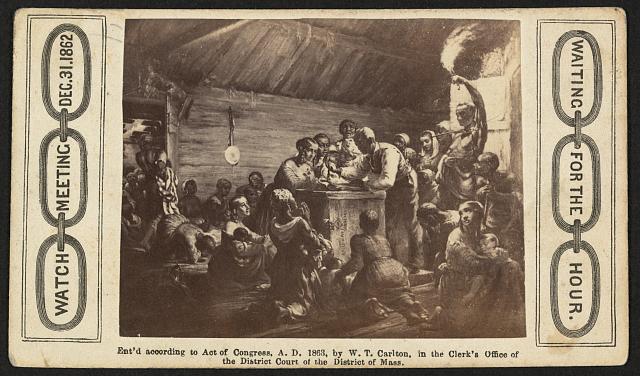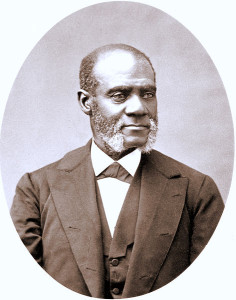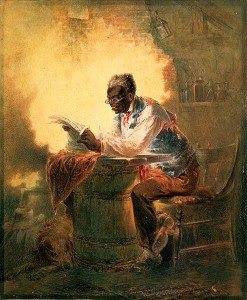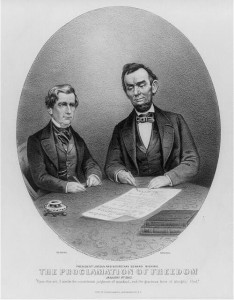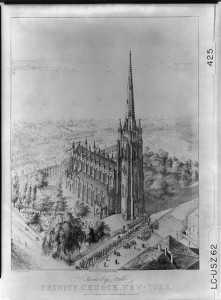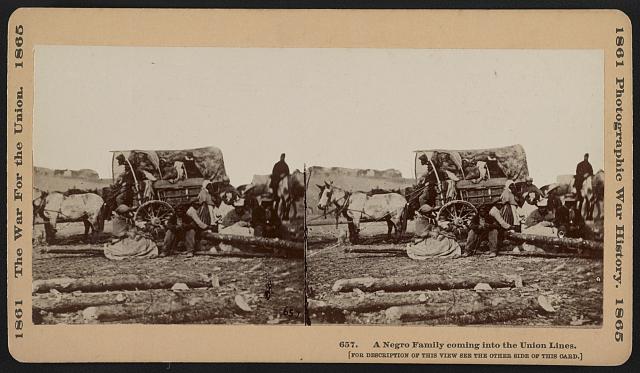From The New-York Times January 1, 1863:
GRAND EMANCIPATION JUBILEE.; A Night-watch of Freedom at Shiloh Church Great Excitement and Rejoicing Among the Colored People Prayers, Speeches, Songs, Dirges and Shouts. The Chimes at Trinity. RINGING THE OLD YEAR OUT AND THE NEW YEAR IN. …
In anticipation of the Emancipation Proclamation which the President is expected to issue to-day, the colored people of this City held a grand jubilee last night at Shiloh Presbyterian Church, corner of Prince and Marion streets. By 9 o’clock in the evening the church was filled to overflowing, nearly one-third of the audience being white. Rev. HENRY HIGHLAND GARNET, pastor of Shiloh Church presided, and among the speakers were Rev. S.C. JOCELYN, C.C. LEIGH, EDWARD GILBERT, JUNIUS C. MORELL, and others.
The ceremonies were opened at 10 o’clock by prayer from Rev. DANL. H. VANDEWOORT, colored. After this came a hymn, and the Chairman then introduced Rev. G.S. JOCELYN, who spoke of the progress of Emancipation throughout the world, instancing England, Turkey, Russia, the District of Columbia, &c. The most loyal people in this country he said were the blacks, and if the President’s Emancipation Proclamation had been issued on the firing of the first gun at Fort Sumter the nation would have been saved the deluge of blood that had since flowed throughout the land. [Applause.] The next speaker was Hon. C.C. LEIGH who recounted the meritorious deeds of the black men in past ages, and exhorted his hearers to emulate their example, and show themselves worthy of the position among the races which they aspired to reach. Turning to the institution of Slavery in this country, he spoke in severe terms of the support it had received from a corrupt and hireling clergy. No vile debauchee, he said, had ever lived, no bold blasphemer, no scoffer from the purlieus of vice, up to the polished HUME or the wit VOLTAIRE, had ever inflicted such stabs upon our holy religion as these hireling priests, who make the Word of God speak in favor of that “sum of all villainies,” American Slavery. [Great applause.] The speaker closed by exposing the love and veneration he had always entertained for the old flag of his country, which, now that it was about to be unfurled in the cause of universal freedom, was still more dear to his heart than ever before.
Mr. JULIUS C. MORELL was then introduced as a native of North Carolina, and said that, though he was born in the Old North State, he felt no particular pride in it, for he had seen many other places which he would have preferred to be born in. North Carolina, he said, was a very good place to be born in, and a most excellent place to get out of. [Laughter and applause.] The speaker recounted many of the barbarities of Slavery that had come under his observation when a boy, and said that the present rebellion would have broken out long ago had it not been for the much reviled Abolitionists. The black men of the South were long ago maturing plans of a general uprising, which would have deluged the South in blood, but about that time the anti-Slavery societies of the North sprung up, and, through their preaching and promises, the slaves were induced to keep quiet. He, however, saw the finger of God in this delay. It was His design to chastise the nation for the great sin of Slavery ere the bond of the slave were broken. This was now being done by civil war, when almost every home throughout the land was filled with lamentation and mourning.
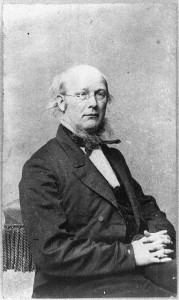
phantom sighting of of one who had “done more to destroy this vile institution of Slavery than any man in the country”
At the close of Mr. MORELL’s remarks, the Chairman, Mr. GARNET arose and said that he perceived a person in the audience who, if he should die in the next five minutes, would have done more to destroy this vile institution of Slavery than any man in the country — he referred to HORACE GREELEY. [Loud cheers for HORACE GREELEY, and cries of “GREELEY,” “GREELEY.”] When the tumult following the announcement of Mr. GREELEY’s name had subsided, Mr. GARNET stated to the audience that he should be obliged to take it all back; he was mistaken in the man; it was nor Mr. GREELEY after all. [Great laughter.] He hoped the gentleman would not take it as an offence to be mistaken for Mr. GREELEY, for nobody would be ashamed to look like him.
A VOICE — Some of the most eminent writers have called Mr. GREELY handsome. [Great laughter.]
Mr. GARNET here announced that it lacked only 15 minutes of 12 o’clock, and at 5 minutes before 12 the audience would unite in silent prayer. Meantime, Mr. GILBERT would address the audience.
Mr. GILBERT commenced speaking, but had not gone far before he was requested to stop, as the time for prayer had arrived.
A solemn dirge was then played on the organ. At the close of which the whole audience knelt for five minutes in silent prayer.
At the expiration of that time the choir sang the hymn commencing, “Blow, ye trumpets blow, the year of jubilee has come;” in which the audience joined.
The Chairman then read a dispatch from Washington, saying that President LINCOLN would issue the Emancipation Proclamation at 12 o’clock M., to-day.
This anouncement was greeted with the most tumultuous cheers, which lasted some minutes, and were followed by three cheers for ABRAHAM LINCOLN, three cheers for freedom, &c., &c. Mr. GILBERT then resumed his speaking, and threw a damper on the enthusiasm of the audience by commencing to grumble and find fault because the Proclamation was to be “issued as a military necessity, and not as an act of justice.” His audience did not appear to sympathize with his troubles in that line, and he soon dried up.
Other speakers followed, and the jubilee was kept up to a late hour in the evening, the audience singing “Old John Brown” and other similar songs, shouting, praying and rejoicing.
Everybody down town last night who had nothing to do, and a great many who make a special point of hearing the Chimes toll a requiem to the Old Year, and a welcome to the New, crowded the sidewalks of Broadway and Wall-street to hear Mr. JAS. E. AYLIFFE ring his accustomed changes on the bells of Trinity. At about a quarter to twelve the programme was commenced with variations on the full complement of eight bells; then followed the favorite tunes of “Hail Columbia,” “Yankee Doodle,” “Old Dog Tray,” a grand medley, arranged by Mr. GEORGE F. BRISTOW, “Evening Bells,” “Last Rose of Summer,” “Columbia the Gem of the Ocean” and “Yankee Doodle;” the listening public being finally played to their several domicile to the plaintiv-melody of “Home, Sweet Home.” The sky was clear overhead, and the gusts of wind that blew fitfully through the night made the pealing voices of the chimes surge, now mournfully, now merrily, over the lower part of the City. There ought to be a peal of bells up-town, to keep the chimes of Trinity in countenance. …
Henry Highland Garnet was involved in creating black army units for the Union.
Horace Greeley published his The Prayer of the Twenty Millions on August 19, 1862.

